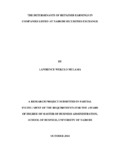| dc.description.abstract | The firms are always faced with a problem of making the financing decision that will maximize the firm’s value. The decision about allocation of net income between dividends and retained earnings can have a critical influence on the value of the company. The change in retained earnings is influenced by certain factors. However, these factors are still not very clear. The purpose of this study was to examine the determinants of retained earnings in companies listed at NSE. The factors which were tested are; firm size, dividend payout, growth opportunities, profitability, tangibility of assets, and leverage. Both the longitudinal and cross-sectional research designs were employed to enhance the study of companies listed under different segments during the period between 2009 and 2012. Only 41 non-financial companies listed at NSE were studied while financial companies were excluded from the study to remove any anomalies associated with this sector which is highly regulated by the central bank prudential on issues of liquidity, asset and capital holding, and provision for bad debts among other factors. Secondary data from published reports and financial statements at NSE was used in this study. Data was collected by use of data collection sheet. The study employed a multiple regression data analysis technique where tools of SPSS were used. The research findings indicated that there was a weak positive relationship between profitability and retained earnings. The study also revealed that both the firm size and growth opportunities had a weak negative relationship with the retained earnings. Dividend payout ratio was found to have little or no relationship with the retained earnings. The study results showed a strong negative relationship between leverage and the retained earnings. This supported both the pecking order theory and trade-off theory which predict a negative relationship between leverage and retained earnings. Last but not least, assets tangibility was found to have a significant positive relationship with retained earnings. Therefore, it is evident that the change in retained earnings is mainly influenced by the leverage and tangibility of assets and some factors other than those ones tested in this study | en_US |

